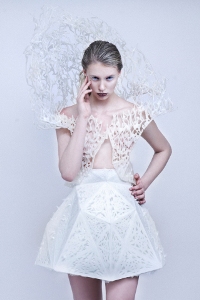When you think of polygons, you don’t typically think of a cutting edge piece of clothing, but MakerBot and Francis Bitonti have changed that equation with the introduction of the Bristle Dress. The Bristle Dress is a fully 3D printed dress designed in Francis Bitonti’s New Skins Brumal Bodies: Computational Design for Fashion Winter 2014 workshop held at the Metropolitan Exchange in Brooklyn, N.Y., and 3D printed on MakerBot® Replicator® 2 Desktop 3D Printers.
The Bristle Dress was created with students from multiple design industries and used computational design, one of the newest trends in the fashion industry. As an end result of the workshop, Francis Bitonti envisioned a day when you could go to Thingiverse.com and 3D print a couture dress. Now that the Bristle Dress has been created, that day is today: The Bristle Dress is customizable and available for download from MakerBot’s website Thingiverse.com so it can be 3D printed at home.
 Model Ica Paru wears the Bristle Dress, created in Francis Bitonti's New Skins Brumal Bodies: Computational Design for Fashion Winter 2014 workshop. The dress was 3D printed on MakerBot(R) Replicator(R) 2 Desktop 3D Printers and will be available for viewing at the New York City MakerBot retail store on Mulberry Street during the month of April and is downloadable for 3D printing from Thingiverse.com. Photo credit: Chris Vongsawat; Hair/Makeup: Aviva Leah.
Model Ica Paru wears the Bristle Dress, created in Francis Bitonti's New Skins Brumal Bodies: Computational Design for Fashion Winter 2014 workshop. The dress was 3D printed on MakerBot(R) Replicator(R) 2 Desktop 3D Printers and will be available for viewing at the New York City MakerBot retail store on Mulberry Street during the month of April and is downloadable for 3D printing from Thingiverse.com. Photo credit: Chris Vongsawat; Hair/Makeup: Aviva Leah.
“What’s so exciting about the Bristle Dress is the way it showcases how versatile and artistic 3D printing can be,” noted Bre Pettis, CEO of MakerBot. “Francis and the New Skins workshop used both MakerBot PLA Filament and MakerBot Flexible Filament to create this dress. Its fluidity and movement surrounding the body and head are really beautiful and it’s exciting to see our products used to bring fashion design into the next era.”
The New Skins Workshop series began the summer of 2013 as a collaboration between MakerBot and Francis Bitonti Studio in Brooklyn. The intensive design/prototyping workshop, originally hosted at the Pratt Institute Digital Arts and Humanities Research Center (DHARC) and led by designer Francis Bitonti, ran as a three-week course and included a presentation to a panel of critics and industry experts including architect and designer Vito Acconci, mononymic fashion designer Jona from INAISCE, and representatives from MakerBot, leading up to the final realization of the Verlan Dress, the first 3D printed dress created in the workshop.
Francis Bitonti explains, “The workshops are about finding the new aesthetic formal language of this new manufacturing paradigm. It’s not just about replicating a form from the computer, though that is part of it—it’s about cultivating new material behaviors.”
The Bristle Dress was created by exploring different techniques to create volume through the use of 3D printing. The upper part of the dress was designed to be 3D printed in MakerBot Natural PLA Filament (clear), selected for its translucent qualities. The skirt was created using MakerBot Flexible Filament. The skirt of the dress was also lined with synthetic fur. The result is a flexible yet highly structured garment that creates an interesting overall silhouette and combines both artificial and natural textures. The skirt portion of the dress is customizable and is the whole dress available for download on Thingiverse.com.
Francis Bitonti, a designer who was originally trained in architecture, is ushering in a new manufacturing paradigm through his innovative use of computational design techniques and disruptive manufacturing technologies. His first 3D printed dress was the curve-hugging Dita Von Teese dress. “I see technology as deeply connected to being human,” says Bitonti. Bitonti’s design process is a blend of cutting edge digital design and manufacturing technologies, aimed to transform mass production. Looking instead to the future of manufacturing; mass customization, Bitonti sees computational design, smart materials, and interactive environments as opportunities to create new aesthetic languages for our built environment and he has taken that vision and applied it to a wide range of disciplines ranging from architecture to product design to fashion. Francis Bitonti’s work has been published in outlets such as the Wall Street Journal, V Magazine, Wired, and The New York Daily News and continues to garner global recognition. Francis Bitonti currently lives in New York where he runs his design practice.
The Bristle Dress will be shown at the New York MakerBot Store during the month of April and then at a culminating exhibition at Ravensbourne in London this summer. For more information on how 3D printing can contribute to fashion and other design industries, visit makerbot.com. For more information on Francis Bitonti or to register for The New Skins Workshop in San Francisco or London, visit francisbitonti.com.